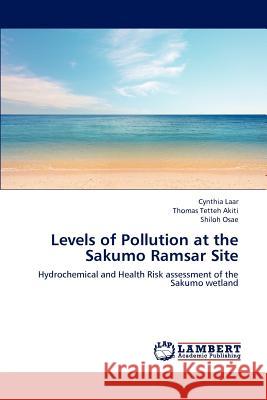Levels of Pollution at the Sakumo Ramsar Site » książka
Levels of Pollution at the Sakumo Ramsar Site
ISBN-13: 9783659175381 / Angielski / Miękka / 2012 / 104 str.
The objective of this research was to assess the level of pollution in the Sakumo wetland with emphasis on heavy metals contamination and their distribution in the wetland, which is being polluted from industrial, domestic and sewage effluents. Samples of water, sediment and fish were collected and analyzed for the concentration of heavy metals (arsenic, cadmium, chromium, copper, iron, mercury, nickel and zinc) using atomic absorption spectrophotometry (AAS). The sequence of order of the heavy metals in the water, sediment and fish samples observed in the wetland was as follows: Fe > Mn > Cu >Hg, Mn > Fe> V> Cr > Cu >Zn As >Co > Cd > Hg, Fe > Cu > Mn> V> Hg > Cd respectively. The results showed high levels of copper and managanese in all three samples (water, sediment and fish) however, mercury and cadmium were available in relatively low concentration in the fish samples. Sampled sediment materials revealed highest concentrations of the heavy metals. Fe, Mn, and Zn concentration in fish samples were higher than WHO/FAO recommended values; however, these heavy metals did not pose any immediate health risk to humans."
The objective of this research was to assess the level of pollution in the Sakumo wetland with emphasis on heavy metals contamination and their distribution in the wetland, which is being polluted from industrial, domestic and sewage effluents. Samples of water, sediment and fish were collected and analyzed for the concentration of heavy metals (arsenic, cadmium, chromium, copper, iron, mercury, nickel and zinc) using atomic absorption spectrophotometry (AAS). The sequence of order of the heavy metals in the water, sediment and fish samples observed in the wetland was as follows: Fe > Mn > Cu >Hg, Mn > Fe> V> Cr > Cu >Zn ≈ As >Co > Cd > Hg, Fe > Cu > Mn> V> Hg > Cd respectively. The results showed high levels of copper and managanese in all three samples (water, sediment and fish) however, mercury and cadmium were available in relatively low concentration in the fish samples. Sampled sediment materials revealed highest concentrations of the heavy metals. Fe, Mn, and Zn concentration in fish samples were higher than WHO/FAO recommended values; however, these heavy metals did not pose any immediate health risk to humans.











